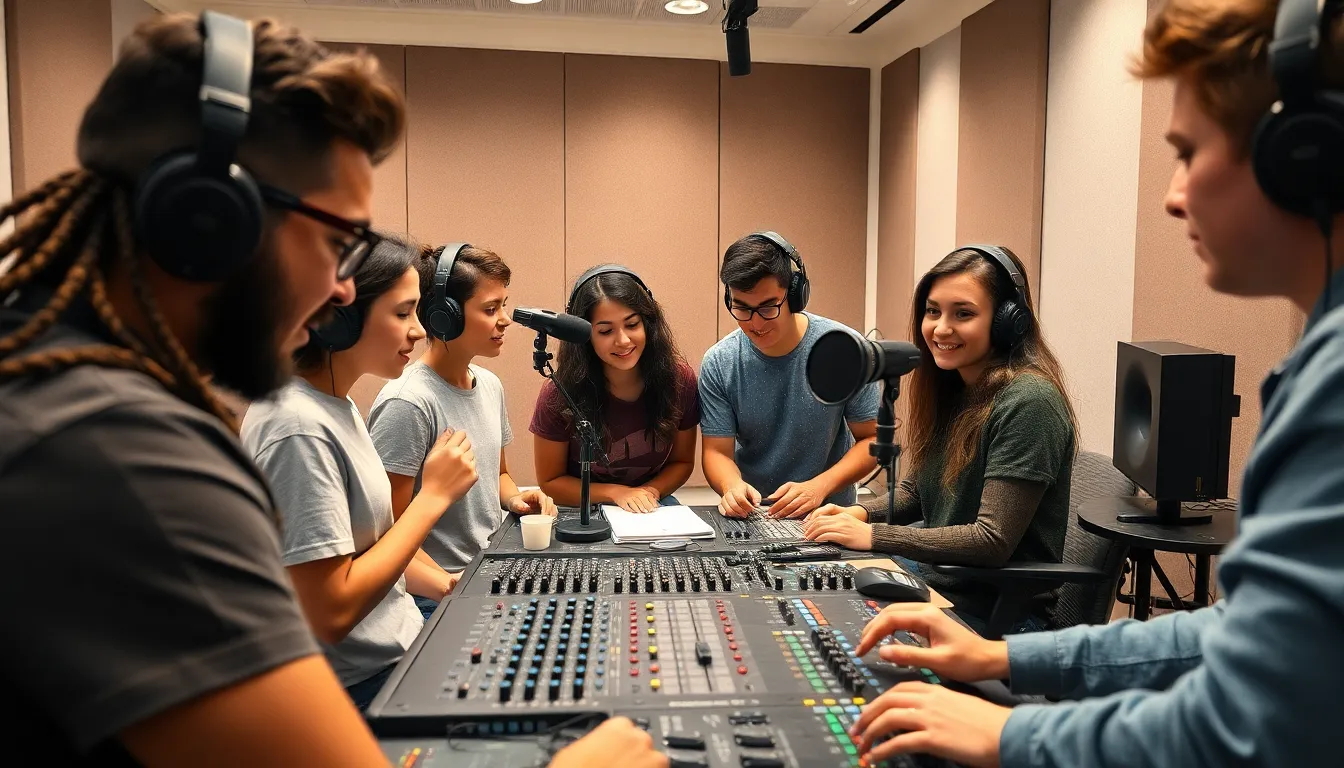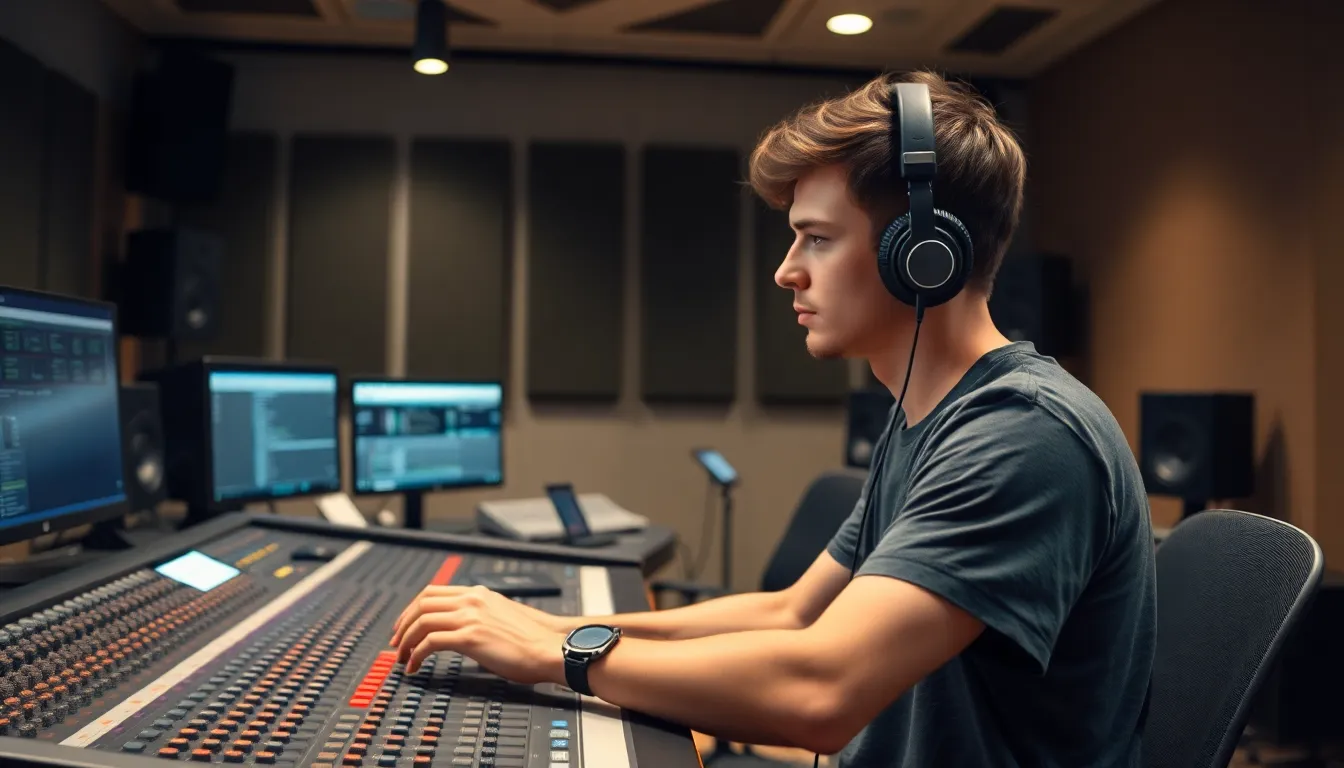In a world where every beat counts and sound is king, pursuing an audio technology degree might just be the most rewarding decision one can make. Whether it’s mixing tracks that make people dance or designing soundscapes that bring stories to life, this degree opens the door to a realm where creativity meets cutting-edge technology.
Imagine transforming your passion for music and sound into a career that’s as dynamic as the beats you love. With the right training, one can master everything from recording techniques to audio production, all while having a blast in a field that’s anything but boring. So, if you’re ready to turn up the volume on your future, an audio technology degree could be your ticket to a harmonious and fulfilling career.
Table of Contents
ToggleOverview of Audio Technology Degree
An audio technology degree provides essential training in sound recording, production, and advanced technology applications. Programs typically cover diverse subjects, including audio engineering, sound design, music production, and acoustics. Students gain hands-on experience with industry-standard equipment and software, preparing them for various roles within the music and sound sectors.
Key skills developed through this degree program include:
- Sound Engineering: Mastering techniques for recording, editing, and mixing audio to achieve high-quality results.
- Audio Production: Learning the processes involved in producing music and soundtracks for various media.
- Critical Listening: Enhancing the ability to analyze audio quality, providing feedback for improvement.
- Technology Proficiency: Familiarizing with digital audio workstations (DAWs) and other essential technologies.
Curricula often incorporate practical projects, internships, and collaborations with industry professionals. Such experiences help students build robust portfolios and professional networks, crucial for securing jobs post-graduation.
Graduates with an audio technology degree frequently find careers as:
- Audio Engineers: Responsible for technical aspects during recording and mixing sessions.
- Sound Designers: Creating audio environments for films, games, or theater productions.
- Music Producers: Overseeing the complete production process for musical artists and projects.
- Broadcast Technicians: Operating sound equipment in radio and television studios.
The growing demand for skilled professionals in the entertainment industry enhances the value of this degree. It equips students with both the creative and technical expertise necessary for success in a rapidly evolving field.
Curriculum Highlights

Curricula for an audio technology degree integrate essential theoretical knowledge with practical skills, preparing students for careers in the audio industry. Courses emphasize sound recording, production, and the application of advanced technologies.
Core Courses
Core courses typically encompass audio engineering, sound design, music production, and acoustics. Students engage in hands-on training using industry-standard equipment and software. Coursework often includes critical listening exercises to develop a keen ear for quality sound. Fundamental principles of sound physics and signal processing provide a strong foundation. By completing these courses, students acquire vital technical skills, ensuring readiness for real-world audio projects.
Elective Courses
Elective courses allow students to specialize in areas of interest, such as live sound production, post-production audio, and music for film. These electives enhance skills in project management, advanced audio editing, and soundscaping. Students may also explore digital audio workstations (DAWs) and music theory to deepen their understanding. Collaborative projects with peers and industry professionals often characterize these courses, promoting teamwork and networking opportunities. By selecting relevant electives, students tailor their education to fit specific career goals within the audio technology field.
Career Opportunities
Graduates with an audio technology degree find diverse career paths in various sectors, leveraging their creative and technical skills.
Job Roles in Audio Technology
Audio technology graduates pursue roles like:
- Audio Engineer: Manages recording sessions, edits sound tracks, and ensures the quality of the audio output.
- Sound Designer: Creates soundscapes and effects for film, video games, or installations, enhancing the auditory experience.
- Music Producer: Oversees the production of music tracks, guiding artists and managing recording sessions.
- Broadcast Technician: Operates and maintains equipment for radio and television broadcasts, ensuring optimal sound quality.
These roles involve collaboration with artists, producers, and other technical staff, requiring a mix of creativity and technical expertise.
Industries That Hire Audio Technologists
Audio technologists are in demand across various industries, including:
- Entertainment: Work in film, television, and music production to create soundtracks and manage audio quality.
- Gaming: Collaborate with developers to design immersive sound experiences in video games.
- Broadcasting: Assist in radio and television by managing sound quality during live or recorded shows.
- Corporate: Provide audio solutions for presentations, conferences, and marketing materials.
This wide applicability underscores the importance of audio technology skills in the modern job market.
Admission Requirements
Admission to an audio technology degree program typically involves specific criteria that prospective students must meet. These requirements ensure a foundational understanding of audio principles and readiness for advanced study.
Prerequisites for Enrollment
Prerequisites for enrollment often include a high school diploma or equivalent, along with a strong interest in music and technology. Some programs may require applicants to submit evidence of prior experience in audio or music production. Additionally, standardized test scores, such as the SAT or ACT, might be necessary for some institutions.
Application Process
The application process generally involves submitting an online application form along with supporting documents. These documents may include high school transcripts, letters of recommendation, and a personal statement detailing the applicant’s goals in the audio field. Many programs also request a portfolio showcasing previous work in audio or music production. Some institutions might schedule interviews to assess candidates’ passion and fit for the program.
Pursuing an audio technology degree opens doors to a vibrant career in the music and sound industry. It equips students with the skills needed to thrive in various roles, from audio engineering to sound design. With a blend of creativity and technical training, graduates are well-prepared to meet the demands of a rapidly evolving field.
The hands-on experience gained through practical projects and internships enhances their employability, allowing them to build valuable networks. As the industry continues to grow, the opportunities for audio technologists are expanding. This degree is not just an academic pursuit; it’s a stepping stone toward a fulfilling and dynamic future in audio technology.




